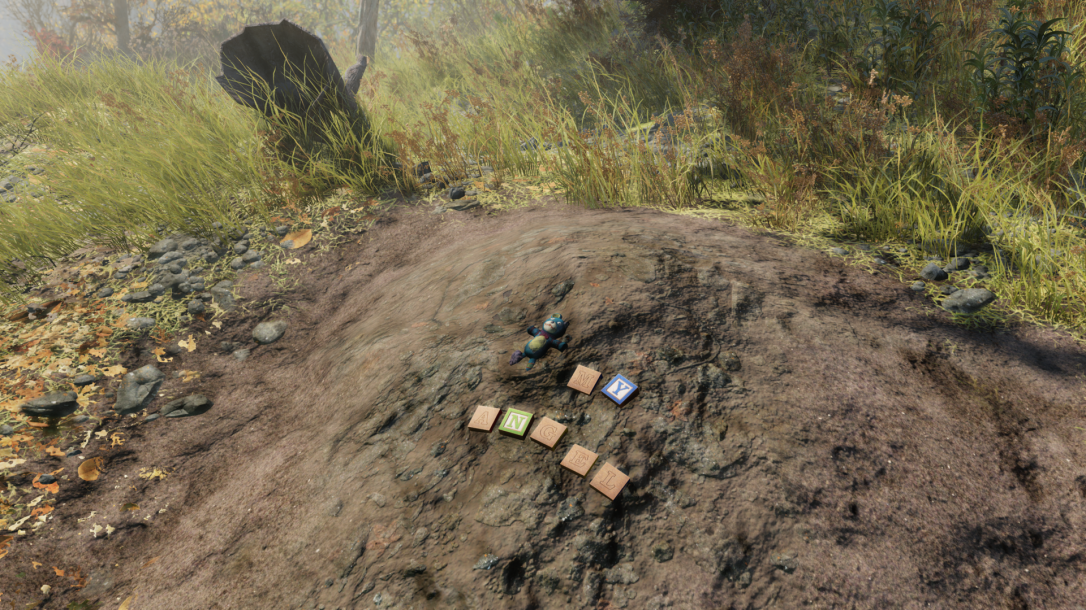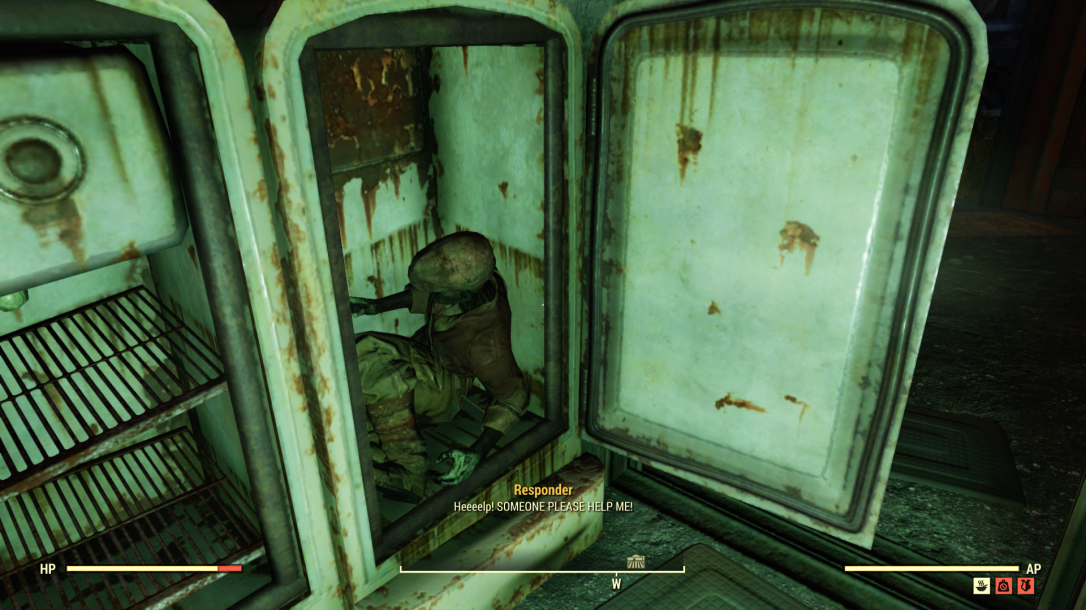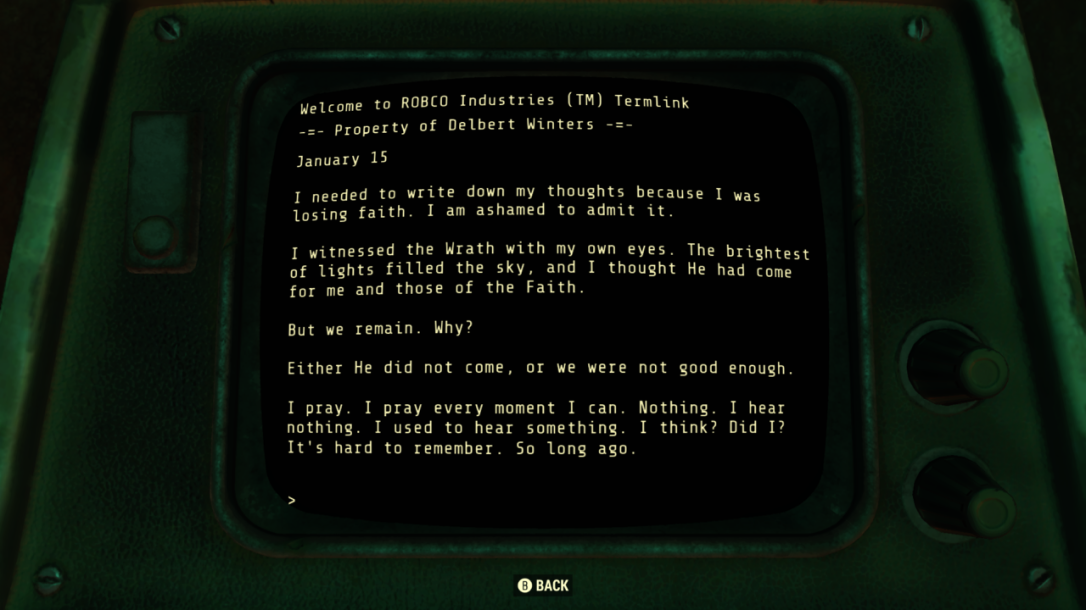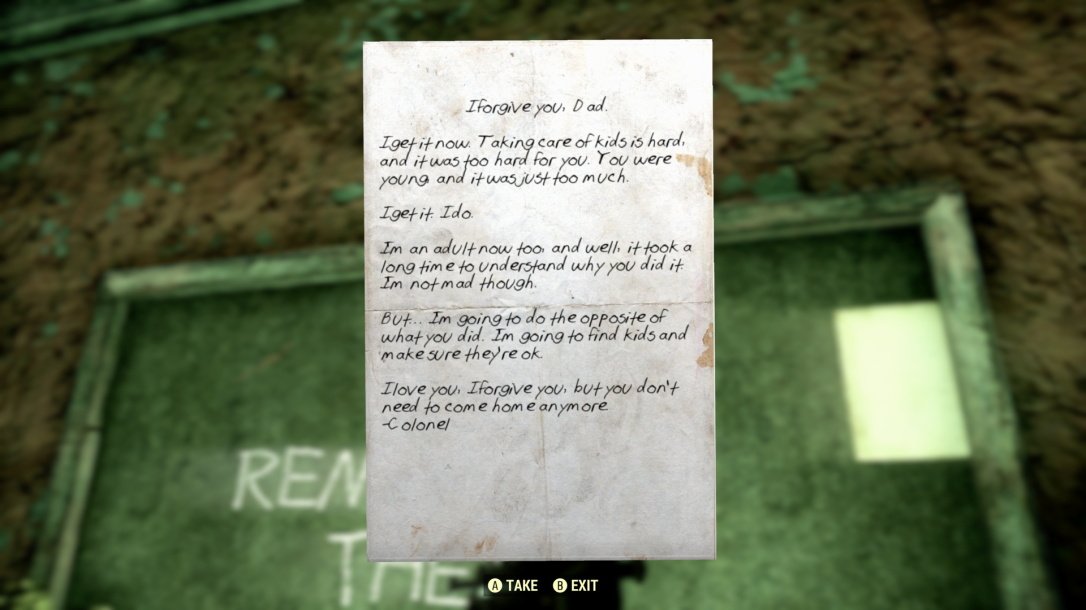I have to admit that even I hesitated briefly when Bethesda announced that Fallout 76 would have no human NPCs. After all, the eclectic array of survivors (along with their equally eclectic stories, ambitions, and machinations) has always been part of the charm of the Fallout series. The more I thought about it though, the more the decision makes sense in ways other than just the post-apocalyptic timeline.
After all, Bethesda has been conveying stories through their extensive world design and eye for detail in each of their titles for years now.

In Fallout’s case: whether it’s a carefully placed skeleton clutching a dusty teddy bear in the dark of an abandoned bunker or hastily painted warnings scrawled across a boarded door, there is an entire world telling players more about their surroundings than any digestible, scripted dialogue with an NPC could.
Fallout 76 is no different. After exiting the Vault and stepping foot into Appalachia, the player discovers Flatwoods, an abandoned town being used as a headquarters for one of 76’s new factions: The Responders. Made up of emergency servicemen and women, the Responders banded together to help any and all in the wake of the bombs dropping. While the camp is empty of live, human NPCs it becomes increasingly apparent what became of the inhabitants as the player explores.
A dead NPC locked in a broken fridge with a lootable Holotape that, when played, shares his last frantic moments alive with the player and reveals that the Responder’s camp fell victim to a Raider attack. While no survivors remain to tell the tale, the player finds the things they left behind and is able to piece together both the good and the bad of this new world.

Meanwhile, a personal computer terminal containing diary entries from Delbert Winters paint the picture of an elderly man of the cloth searching for meaning and purpose. A series of recorded interviews highlight members of the Responders and their volunteers: who they were before and after the end of the world. Letters pinned to an empty frame are addressed to a father who left his young son behind.
The items found in Fallout 76 feel more raw and emotionally charged than those in any previous Fallout title. Why? Because they are the only thing that connects the player to the other human beings that, for a brief time, survived in this Wasteland. There are countless pieces of personal lives scattered around West Virginia waiting to be read, listened to or simply to be seen if players take the time to look.


This type of storytelling isn’t new but now more than ever, Bethesda has to rely on it to convey an entire story to an entire player base instead of rewarding the inquisitive and persistent few in their single-player experiences with engaging side quests and objectives. Picking up letters and Holotapes, accessing terminals and listening to radio frequencies are some of the ways your Vault-dweller will find their way through West Virginia and do their part in rebuilding America. Picking up where the Responders were forced to leave off.
After all, your character in Fallout 76 is where it all begins. Your Vault dweller is an ancestor to the human NPCs you’ve come to love.
So, if you’re holding out on Fallout 76 out of fear that there isn’t any “story”: you’re doing yourself (and Bethesda) a disservice. The story is there, it’s just up to you to play your part in it. Remember: Fallout is a series that shines even more brightly when players find themselves uncovering the smaller details that are easily missed and overlooked in the vast, post-apocalyptic Wasteland.


I have to admit I’m kind of ambivalent about the idea of finding logs strewn about to tell a story. I think it’s somewhat overused, but at the same time, I understand why it’s such a common fallback; it’s often the only reasonable way to tell a story in a video game with a small cast of characters (or in the case of Fallout, shedding light on the past). It’s usually better to show important plot details rather than talk about them, but when this approach is done well, it can be surprisingly effective.
LikeLiked by 1 person
I agree that sometimes it can come across as a “copout”, especially in games with smaller budgets (fewer characters, voice actors, indie teams, etc.).
What makes the approach effective, in my opinion, is in the quality of the written and audio content. Good writing and memorable voice actors is one thing Bethesda’s got going for them!
LikeLiked by 1 person
It’s true that using logs or diaries found in the world is one way to tell more story than budget would otherwise allow, but I don’t think that means it’s an internally lessor way to tell a story. Sometimes it’s the perfect means to tell a particular story from a particular angle I think. Esp in the case where it’s a story from the past that no one was left after the fact to fully document it. To me it can really add the interest of trying to piece something together and never having quite every piece, like we often have to do with stories from the past. And there’s so much saddness in the tiny captured moments of where an every day thing is left sitting if you take the time to look at it. That for me, when it’s done well, can give more of a feeling of connection to a dead minor character than watching a video or similar. I haven’t played 76 yet, but in general I think Bethesda’s Fallout is really good at that. I also enjoy the experience of discussing the same scene in a game with a friend and we have different interpretations because we didn’t find it notice all the same pieces. Had this a lot with Life is Strange as well as Bethesda games.
LikeLike
I wasn’t “feeling” this version of my beloved Fallout series after playing a few hours of the Beta . But thinking about it from this perspective has changed my mind. I won’t be cancelling my preorder. Thanks EBB!
LikeLiked by 1 person
I hope it ends up earning a place in your heart as a worthy part of the series!
LikeLike
Fallout is one of those franchises that is on my ‘will get to at some point’ list of games. The down side of being a late comer to gaming means that I have a lot of catch up to do and my backlog is long enough already! I’m definitely more intrigued than I was before reading your entry as I’m a sucker for a good story and for piecing things together as I play.
LikeLiked by 1 person
Fallout, like any Bethesda series really, is such a trek in itself too. So much content, so little time. That said, I definitely recommend the series and I hope you get to play it soon!
LikeLike
I gotta admit I hadn’t thought about the fact that this is you playing as the ancestor to future NPCs. 🤔 With that perspective the idea of playing sounds a little more appealing. Thanks!
LikeLike
Totally agree that Fallout is what you make it! I spent hours and hours on it where some of my friends said they just played it as fast as possible to find out the ending. I love building and exploring!
LikeLike
I haven’t started Fallout 4 yet. I think the biggest reason why is because there is so much packed into the game it almost feels overwhelming!
LikeLike
I commented on the discussion before, but just wanted to say that I really like this type of games writing. I’m always looking for blogs to read that help me continue to think about video games all day long, but so many people who write about games want to be reviewers or reporters and it’s just…Generally unexciting reading to me. Something like this is so much more alive to me, it’s personal and has a specific viewpoint. A personal post with your personal experiences in a game is so much more likely to make me look at my game experience from a different angle than any amount of review reading. (No offence to people who write reviews, they serve a purpose and can be helpful, they just aren’t my go to entertainment.)
LikeLike